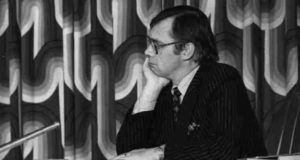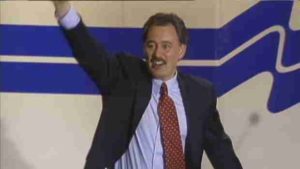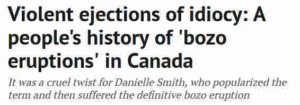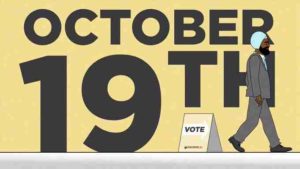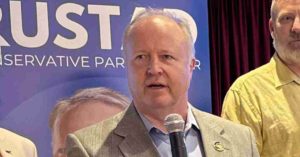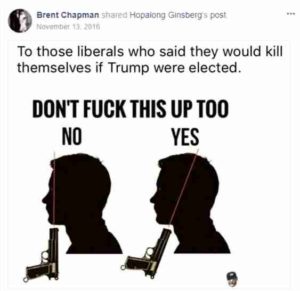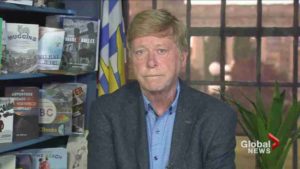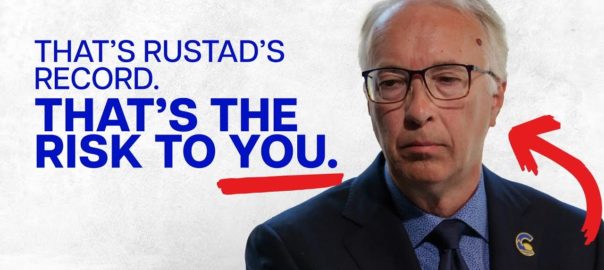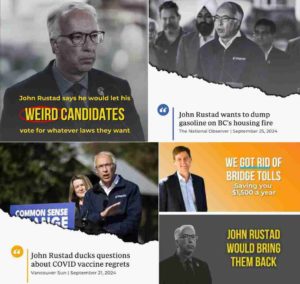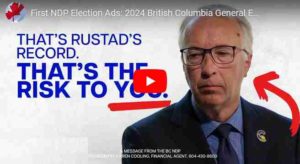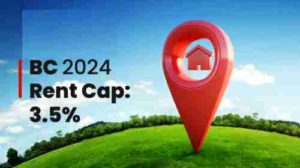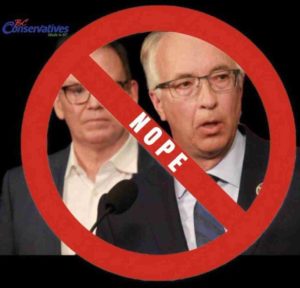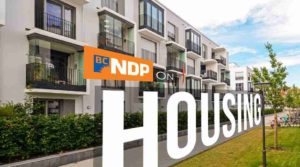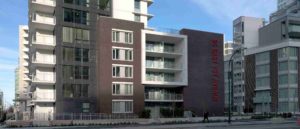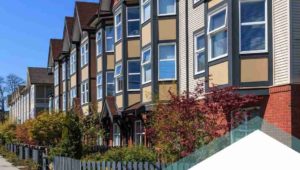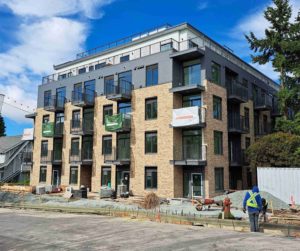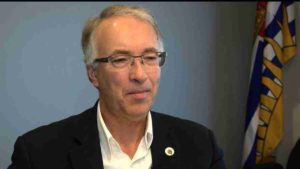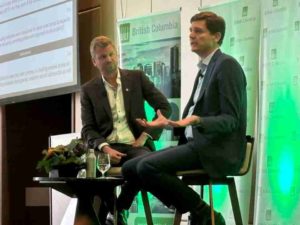
NDPer David Eby wins but loses, Green Sonia Furstenau loses, Con John Rustad sort of wins, for now
The 2024 British Columbia provincial election has set the stage for an extended period of uncertainty and ongoing and troubling political tension.

B.C. NDP supporter reacts as election night results come in (Darryl Dyck/The Canadian Press)
With the BC NDP securing 46 seats, pending a hand count of the ballots in at least two ridings where the vote was close , and the BC Conservatives close behind with 45, the situation is too close to call definitively until the final results, including mail-in ballots, are released on October 28, seven excruciating days from today.
The dynamics are further complicated by the two ridings where Green Party members were elected, and the Saturday night defeat of leader Sonia Furstenau.
David Eby’s path to once again becoming Premier and forming a government hinges on a confidence and supply agreement with the two elected Green MLAs, echoing the 2017 arrangement that brought the BC NDP to power. Eby’s focus on health care reform, particularly the establishment of community clinics, could be a key part of negotiations with the Greens, as Furstenau has made this a priority.
John Rustad and the BC Conservatives’ success, especially in rural areas, positions them as a formidable opposition. Rustad’s call for a new election highlights his confidence in gaining a majority, especially if he manages to unify some of the former BC United candidates who could have tipped the balance in his favour.
The inclusion of controversial conspiracy theorists and anti-vaxxers among the new BC Conservative MLAs introduces a wildcard element to the Legislature, potentially influencing policy debates and public discourse in unpredictable ways. BC’s political landscape is entering a period of heightened polarization, with urban-rural divides and deep ideological differences set to dominate in the coming months.
For Premier David Eby, the 2024 election marks both a personal victory and a daunting political challenge. His BC NDP narrowly held onto power in key urban ridings, particularly in Vancouver, where they won 11 of 12 seats. This urban dominance, especially in Vancouver, helped stave off what could have been a catastrophic defeat for the British Columbia New Democrats, given the rising popularity of the BC Conservatives. However, the BC NDP fell short of the majority needed to govern outright in the 93-seat legislature, placing Eby in a precarious position where his political future hinges on complex negotiations and compromises.
The Rise of the BC Conservatives and John Rustad’s Ambitions
While the BC NDP barely held their ground, the BC Conservatives, led by John Rustad, surged to unprecedented heights, winning 45 seats and dominating much of the rural and interior regions of the province. This represents a dramatic shift in BC’s political landscape, as the Conservatives capitalized on widespread discontent in regions such as the Fraser Valley, the Okanagan, and the North. These areas, which have traditionally felt underrepresented in provincial politics, rallied around Rustad’s message of rural empowerment, deregulation, and resistance to what many see as overreach by the urban-centric NDP.
Rustad’s success is particularly striking given the collapse of BC United, the former centre-right party that was once a dominant force in provincial politics.
Many former BC United voters shifted their support to the BC Conservatives, and Rustad has positioned himself as the new leader of the province’s right-wing movement. Rustad has been vocal in calling for a new election, believing that with just a few more seats, he could secure a majority government. Indeed, had Rustad allowed key figures like Lumby Mayor Kevin Acton and Josh Stein in Vancouver-Langara to run as BC Conservative candidates rather than Independents, he might very well have been in a position to become Premier, and govern British Columbia.
As BC citizens await the final results, the province stands at a political crossroads.

Juan de Fuca-Malahat: 23 votes separate NDPer Dana Lajeunesse & Conservative Marina Sapozhnikov.
Note should be made that, at present, there are 49,000 outstanding mail-in votes that are yet to be counted. The count of the mail-in ballots and the hand count in two ridings could very well alter the outcome of the British Columbia election.
- The B.C. Conservatives were leading in Surrey-Guildford by a margin of 0.6 per cent late on election night. That party’s candidate, Honveer Singh Randhawa, was ahead of NDP incumbent Garry Begg by 102 votes;
- The rookie candidates for both parties in Kelowna-Centre were separated by only 0.6 per cent. Conservative, realtor Kristina Loewen was leading the City Councillor, the NDP’s Loyal Woodridge by only 148 votes;
- Meanwhile, the difference in the race in Courtenay-Comox, between NDP incumbent Ronna-Rae Leonard and the Conservatives’ Brennan Day was 0.7 per cent, with the Conservatives ahead by 232 votes, in that traditionally swing riding.
When the results of the hand count, and the inclusion of the mail-in ballots are announced on October 28th, we’ll know the true outcome of Election 2024.

Surrey City Centre. 96 votes separate the BC NDP’s Amna Shaw and the Conservatives’ Zeeshan Wahla.
The urban-rural divide has deepened, and the ideological gap between the BC NDP and the BC Conservatives will lead to polarization and a contentious Legislature. In the coming months, the province’s political leaders will need to navigate these divisions carefully, as the future of British Columbia hangs in the balance.
How Do Other Political Observers Feel About Saturday’s Election Results?
Business in Vancouver Legislative reporter Rob Shaw: David Eby lost the election.
Despite running with all the advantages of government right up until the writ drop on September 21 — in the form of near-infinite money — resources and power, the Eby administration managed to squander the massive majority and record popularity left to it by predecessor John Horgan.
The NDP was brought to its knees by a BC Conservative party it argued was full of racist, homophobic, science-denying whackos, unfit to even run for public office, let alone hold it. Turns out, not everyone sees the world through the lens of moral superiority that New Democrats do.
Rob Shaw is must reading, with the best post-election political analysis you’ll read anywhere, as he tags Eby for the bare win, but actual loss.

John Rustad and wife Kim at the Conservative after-election event. Photo by Arlen Redekop /PNG.
PostMedia Legislative columnist Vaughn Palmer also blames Eby for the bare win, actual loss, and ponders whether Eby can hold on as leader of the BC NDP.
“Never lacking confidence in himself,” Palmer writes, “Eby vowed to govern until the scheduled election date and show results people could see, feel, touch and experience.
“How’s that working out?” One imagines more than a few New Democrats saying that as they saw their party once again thrown into the arms of the Greens to preserve its hold on power.
The second thing that some might question is Eby’s take-no-prisoners personal attacks on Rustad and the Conservatives.
Eby never seemed to allow that voters might have greater concerns — crime, the drug crisis, housing prices, overcrowded emergency rooms — than a seven-year-old social media posting, however appalling.
Had he toned down the moral superiority, he might have done better with voters who were wanting change.
Yet after presiding over a campaign dominated by vicious, personal attacks, on Saturday night he proclaimed himself “a Premier to bring us together, not drive us apart.’”
Can Eby, having done so badly, survive as leader of an NDP that has done in leaders that disappointed it in the past?”

BC Conservative Leader John Rustad poses for an election night photo. Ethan Cairns | Canadian Press.
Veteran Globe and Mail columnist Gary Mason sticks to the facts, and how David Eby must move forward to retain power in the Legislative assembly in Victoria.
“Barring a change from the current results, the NDP holds a one-seat advantage over the Conservatives,” writes Mason.
“To form a majority it needed 47 seats, so the party will need the help of the two B.C. Green Party MLAs to make a legislative agenda work. The NDP would almost assuredly have to sacrifice one MLA to the position of Speaker, which would make its hold on power even more tenuous.
It’s hard to imagine the Greens ever agreeing to work with Mr. Rustad to give his party a shot at governing, given the Conservatives’ views on climate change and environmental matters more generally.
Mr. Rustad is a proud climate denier. While that seems astonishing in this day and age, I’m certain his skepticism around the science of climate change and COVID vaccines helped boost his popularity. There are many people in B.C., especially in rural parts of the province, that cheered Mr. Rustad on around these issues.
There are others who aren’t likely thrilled over those stands, or even cringe when they think of possibly being governed by a man who is stuck in the dark ages when it comes to climate change, but were willing to set those feelings aside to vote for change.
There was definitely an anti-David Eby sentiment that was pervasive in this election.
Regardless of what happens in the near future, Mr. Eby will need to take a hard look at his progressive agenda over the past two years and ask: Was it too much, too fast?”
Press Progress editor Luke LeBrun writes a must-read article on the Far-Right BC Conservative Candidates who are now BC legislators.
For instance, Tara Armstrong (Kelowna-Lake Country-Coldstream), who claimed a medical doctor who was encouraging the public to get vaccinated was “bought and paid for by big pharma” and a “total fraud.”

Suffice to say, we live in troubling times.
Let all those who cast themselves as progressives hope that David Eby can get his act together, and the BC NDP — when the next election rolls around — runs a more energetic and inspiring campaign, rather than the lacklustre, lethargic, utterly enervating, tone deaf, and uninspiring campaign the party chose to run in 2024.

For those of you who can’t get enough of democracy, and the elections which decide the nature of governance, you will be heartened to know that the 2024 New Brunswick general election is being held today, Monday, October 21st, 2024, where 49 members will be elected to the New Brunswick Legislative Assembly. The election was called at the dissolution of the 60th Assembly, September 19, 2024.
The incumbent Progressive Conservative Party of New Brunswick (PC) government — which has proved to be hardly that, progressive we mean — led by Premier Blaine Higgs since 2018, is seeking a third consecutive term in office.
Higgs’ government has been mired in controversy over the past couple of years, with one high profile Minister after enough resigning from Higgs’ Cabinet in disgust, arising from Higgs’ intolerant decision to jettison New Brunswick’s version of the SOGI 123 programme that, you know, actually treats gender variant / LGBTQ+ children as if they matter — looks to be headed for defeat tonight.
Even if BC voters don’t have their heads screwed on straight — Higgs = Rustad — at least New Brunswickers of conscience do. Yay, is all we can say.
The PCs’ primary opponent is the New Brunswick Liberal Association led by Susan Holt, who is looking tonight to become the province’s 61st Premier.

VanRamblings will take a much needed break, through until late on October 28th.




